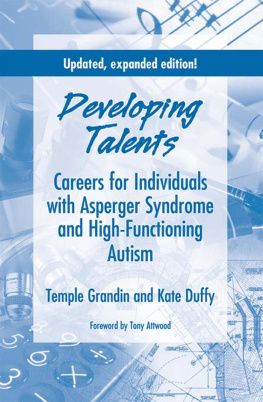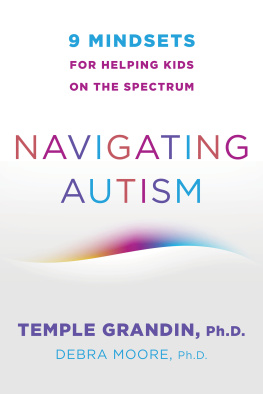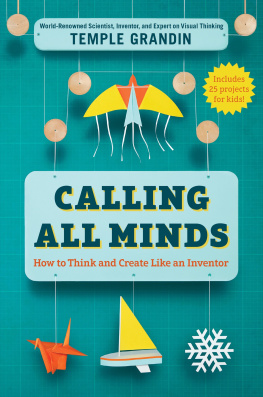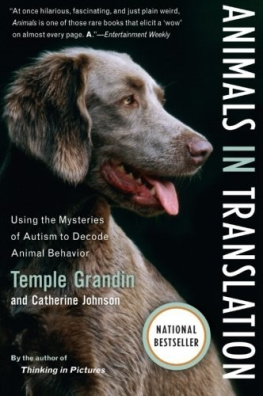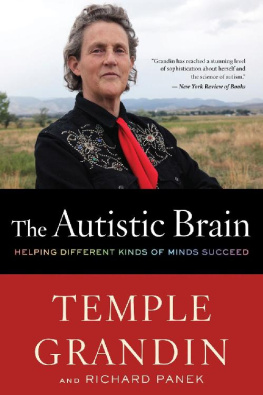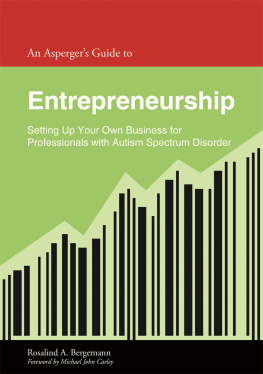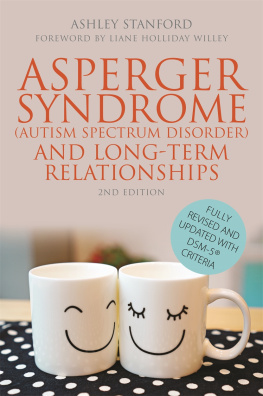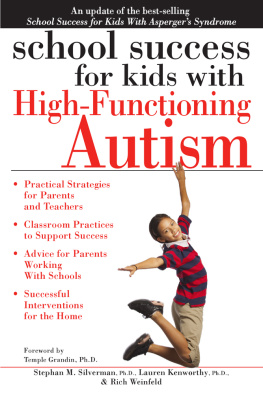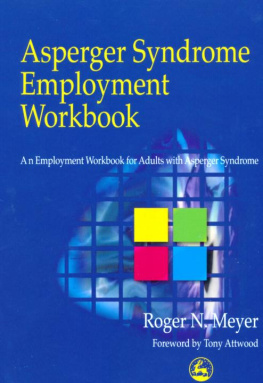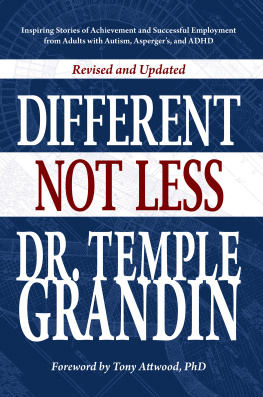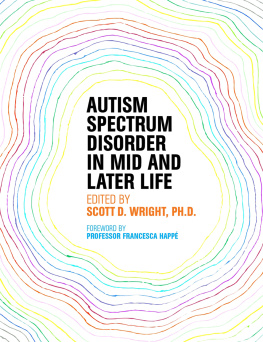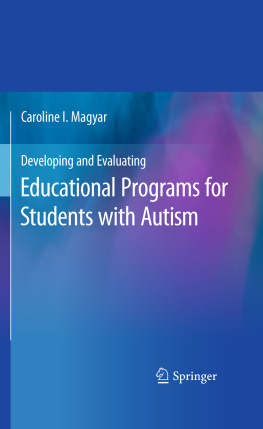Developing Talents
Careers for Individuals with Asperger Syndrome and High-Functioning Autism
Developing Talents
Careers for Individuals with Asperger Syndrome and High-Functioning Autism
Temple Grandin and Kate Duffy
Foreword by Tony Attwood

P.O. Box 23173
Shawnee Mission, KS 66283-0173

2008 Autism Asperger Publishing Co.; first printing 2004
P.O. Box 23173
Shawnee Mission, KS 66283-0173
www.aapcpublishing.net
All rights reserved. No part of the material protected by this copyright notice may be reproduced or used in any form or by any means, electronic or mechanical, including photocopying, recording, or by any information storage and retrieval system, without the prior written permission of the copyright owner.
Publishers Cataloging-in-Publication
Grandin, Temple.
Developing talents : careers for individuals with Asperger syndrome and high-functioning autism / Temple Grandin and Kate Duffy.
p. ; cm.
ISBN: 978-1-934575-28-4 (pbk.)
LCCN: 2008930911
Previous edition: 2004.
Includes bibliographical references.
1. Aspergers syndrome Patients Vocational guidance. 2. Autism Patients Vocational guidance. 3. People with mental disabilities Vocational guidance. 4. People with mental disabilities Employment. I. Duffy, Kate, 1953- II. Attwood, Tony. III. Title. IV. Title: Career for individuals with Asperger syndrome and high-functioning autism.
HV3005.G73 2008 2008930911
331.702/0874--dc22 0808
This book is designed in Legault, Futura Condensed and Stone Sans
Managing Editor: Kirsten McBride
Cover Design: Vivian Strand
Printed in the United States of America
Foreword
A relatively small proportion of adults with Asperger Syndrome or high-functioning autism achieve long-term employment appropriate to their intellectual ability and qualifications. This is a remarkable waste of potential talent. The American workforce needs the benefit of the qualities of people with Asperger Syndrome and autism.
Temple Grandin is a pioneer in terms of her ability to achieve highly successful employment, capitalizing on the very qualities associated with autism spectrum disorders. This book is somewhat like Temple herself: practical, knowledgeable and positive. Together with Kate Duffy, a specialist in career planning, she has written a book that will be of great value to parents, teachers and employment agencies, as well as adults with high-functioning autism and Asperger Syndrome.
The book provides advice and illustrations from Temples own experiences as well as the advice of other adults with autism or Asperger Syndrome who have also achieved lucrative and enjoyable careers. While the benefits in income and independence from successful employment are obvious, I would add that there is another important benefit. As a clinician, I have noted that adults with Asperger Syndrome tend to define themselves by their employment rather than their social network. In other words, their self-esteem is based on the quality of their work. Not surprisingly, therefore, one of the causes of depression in this population is a lack of successful and enjoyable employment. This book has the potential to significantly improve the quality of life of people with high-functioning autism and Asperger Syndrome, their families and society.
Professor Tony Attwood
Dear Parents, Teachers and Counselors,
Thank you for reading this 2nd edition of Developing Talents. When we started working on the first edition in 2002, we were frustrated and concerned by the large number of people on the autism spectrum who either didnt have a job or held one that was much beneath their abilities or talents. Work is so important to the human experience in our culture, and here were great numbers of people who would never know the joy of completing a project, contributing financially to their families, or maybe even living on their own some day.
This was dismal news.
That is why we wrote the 1st edition of what has become a widely used and read resource: to help others on the spectrum learn to find jobs and careers where they could shine.
It is now fall of 2008, and the revised edition of Developing Talents is about to go to the printer. We now have a new concern: Some individuals on the spectrum are graduating from college and are not able to get and keep good jobs. This is most often due to a lack of career-relevant job experiences before they graduate.
What happened? It is not that there arent jobs that these graduates would be good at. Many jobs would be a perfect fit for the analytical, detail-oriented and precise talents of young people on the high-functioning end of the autism spectrum. This book lists quite a few in Chapters 6 and 7. In Denmark, Thorkil Sonne even makes a case that his 75 Asperger employees give his software testing firm a competitive advantage. Who, after all, is more passionate about detail and precision than someone with Aspergers? Sonne, the father of a child on the spectrum, purposely created Specialisterne (www.specialisterne.com) as a workplace haven of sorts for those with Aspergers, with its well-defined expectations, organized office space and less stressful environment.
Specialisternes clients include corporate giants Microsoft and Oracle, and before new employees can even think about getting close to one of their software programs, they have to know what is expected of them, technically and socially keep your cool, work hard and you have an interesting and fulfilling job. In other words, Sonnes employees have to pay attention to what the company needs and wants from them in order to be successful. Not a bad trade-off; people have been doing it for years. But there seem to be an awful lot of young people who havent learned about that trade-off, who arent particularly interested in what other people need or want even employers.
We know that people on the spectrum tend to resist change and many lack the motivation to try new things. In my own case, as a teenager I didnt want to spend the summer at my aunts ranch out west. One of the reasons was that they had no TV at the ranch. Mother insisted that I go but told me that if I hated it, I could come home after two weeks.
I ended up staying all summer! I loved the ranch, and my favorite TV show soon became less important. In fact, staying at the ranch started my cattle chute obsession, which formed the starting point for my career. But first, I had to move from my obsession of talking about cattle chutes to designing cattle facilities. Sometimes parents and teachers have to push an individual on the spectrum to try new things.
But expect that pushing to bear fruit slowly. My mother told me for six months that I would be spending that summer on my aunts ranch. In a way I was prepared to go, even though I didnt like the idea. Here are some other ways for young people on the spectrum to prepare for a life of their own:
1. Go slowly, but go in the direction that interests you by holding down a job or an internship, preferably in a field in which youre interested in working. The three Aspies who tell their stories in Chapter 9 all had jobs when they were in high school. They gained work experience by delivering newspapers, mowing lawns, selling greeting cards, and working in a store and on a farm.

